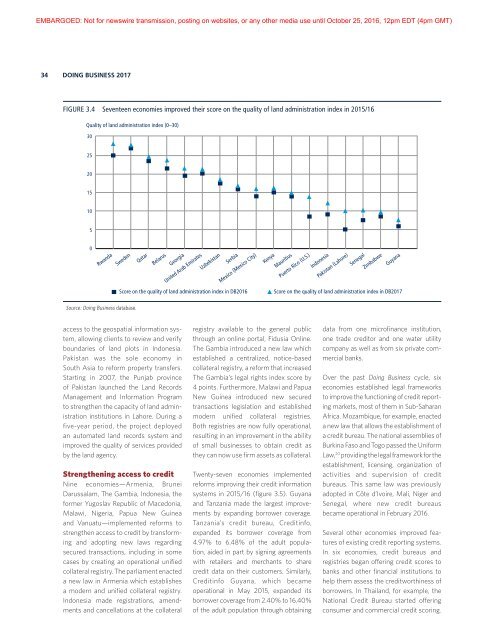49709doing-worldbank
49709doing-worldbank
49709doing-worldbank
You also want an ePaper? Increase the reach of your titles
YUMPU automatically turns print PDFs into web optimized ePapers that Google loves.
EMBARGOED: Not for newswire transmission, posting on websites, or any other media use until October 25, 2016, 12pm EDT (4pm GMT)<br />
34<br />
DOING BUSINESS 2017<br />
FIGURE 3.4 Seventeen economies improved their score on the quality of land administration index in 2015/16<br />
Quality of land administration index (0–30)<br />
30<br />
25<br />
20<br />
15<br />
10<br />
5<br />
0<br />
Rwanda<br />
Sweden<br />
Qatar<br />
Belarus<br />
Georgia<br />
United Arab Emirates<br />
Uzbekistan<br />
Serbia<br />
Mexico (Mexico City)<br />
Kenya<br />
Mauritius<br />
Puerto Rico (U.S.)<br />
Indonesia<br />
Pakistan (Lahore)<br />
Senegal<br />
Zimbabwe<br />
Guyana<br />
Score on the quality of land administration index in DB2016<br />
Score on the quality of land administration index in DB2017<br />
Source: Doing Business database.<br />
access to the geospatial information system,<br />
allowing clients to review and verify<br />
boundaries of land plots in Indonesia.<br />
Pakistan was the sole economy in<br />
South Asia to reform property transfers.<br />
Starting in 2007, the Punjab province<br />
of Pakistan launched the Land Records<br />
Management and Information Program<br />
to strengthen the capacity of land administration<br />
institutions in Lahore. During a<br />
five-year period, the project deployed<br />
an automated land records system and<br />
improved the quality of services provided<br />
by the land agency.<br />
Strengthening access to credit<br />
Nine economies—Armenia, Brunei<br />
Darussalam, The Gambia, Indonesia, the<br />
former Yugoslav Republic of Macedonia,<br />
Malawi, Nigeria, Papua New Guinea<br />
and Vanuatu—implemented reforms to<br />
strengthen access to credit by transforming<br />
and adopting new laws regarding<br />
secured transactions, including in some<br />
cases by creating an operational unified<br />
collateral registry. The parliament enacted<br />
a new law in Armenia which establishes<br />
a modern and unified collateral registry.<br />
Indonesia made registrations, amendments<br />
and cancellations at the collateral<br />
registry available to the general public<br />
through an online portal, Fidusia Online.<br />
The Gambia introduced a new law which<br />
established a centralized, notice-based<br />
collateral registry, a reform that increased<br />
The Gambia’s legal rights index score by<br />
4 points. Furthermore, Malawi and Papua<br />
New Guinea introduced new secured<br />
transactions legislation and established<br />
modern unified collateral registries.<br />
Both registries are now fully operational,<br />
resulting in an improvement in the ability<br />
of small businesses to obtain credit as<br />
they can now use firm assets as collateral.<br />
Twenty-seven economies implemented<br />
reforms improving their credit information<br />
systems in 2015/16 (figure 3.5). Guyana<br />
and Tanzania made the largest improvements<br />
by expanding borrower coverage.<br />
Tanzania’s credit bureau, Creditinfo,<br />
expanded its borrower coverage from<br />
4.97% to 6.48% of the adult population,<br />
aided in part by signing agreements<br />
with retailers and merchants to share<br />
credit data on their customers. Similarly,<br />
Creditinfo Guyana, which became<br />
operational in May 2015, expanded its<br />
borrower coverage from 2.40% to 16.40%<br />
of the adult population through obtaining<br />
data from one microfinance institution,<br />
one trade creditor and one water utility<br />
company as well as from six private commercial<br />
banks.<br />
Over the past Doing Business cycle, six<br />
economies established legal frameworks<br />
to improve the functioning of credit reporting<br />
markets, most of them in Sub-Saharan<br />
Africa. Mozambique, for example, enacted<br />
a new law that allows the establishment of<br />
a credit bureau. The national assemblies of<br />
Burkina Faso and Togo passed the Uniform<br />
Law, 20 providing the legal framework for the<br />
establishment, licensing, organization of<br />
activities and supervision of credit<br />
bureaus. This same law was previously<br />
adopted in Côte d’Ivoire, Mali, Niger and<br />
Senegal, where new credit bureaus<br />
became operational in February 2016.<br />
Several other economies improved features<br />
of existing credit reporting systems.<br />
In six economies, credit bureaus and<br />
registries began offering credit scores to<br />
banks and other financial institutions to<br />
help them assess the creditworthiness of<br />
borrowers. In Thailand, for example, the<br />
National Credit Bureau started offering<br />
consumer and commercial credit scoring.


